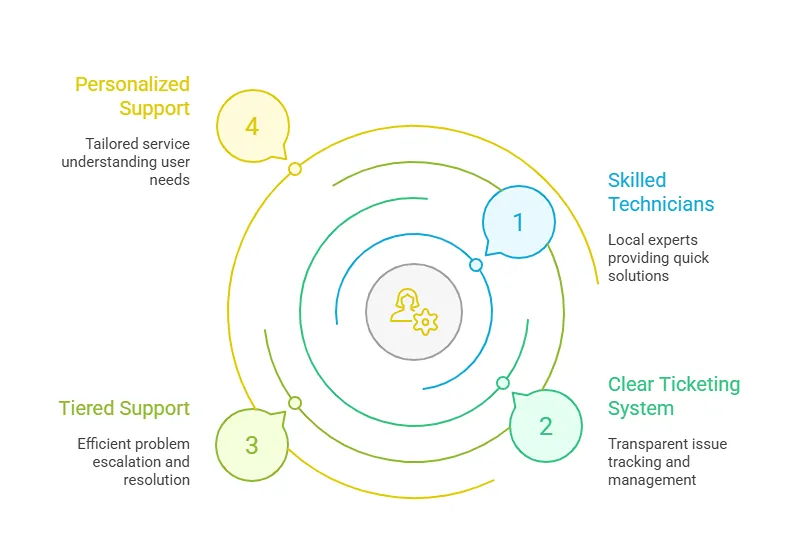Keeping IT stable, secure, and efficient costs time and money. However, many businesses lack the internal resources to keep up, especially as systems grow more complex and threats become more frequent.
That’s where managed services fill the gap, offering expert support that’s scalable, proactive, and cost-effective. According to Deloitte’s 2022 Global Outsourcing Survey, 76% of surveyed organizations were actively outsourcing IT functions.
| “We see a real shift: firms no longer see managed IT as a luxury but as a must-have for staying competitive.” – Bradd Konert, President of Gamma Tech Services |
In this blog, you’ll learn about 9 key types of managed services that help you cut costs, reduce downtime, and stay secure. Each section shows what these services do, why they matter, and how they protect your bottom line.
Strengthen Security and Boost Productivity Today!
Learn how proactive monitoring, fast IT helpdesk, and expert consulting reduce downtime and business risk.
Get Started Today1. Managed IT Services Keep Systems Running Smoothly
You need your IT systems to work without interruption. Managed IT services handle maintenance, updates, and fixes before issues turn into problems. This means your systems are constantly monitored to catch problems early, often before you even notice them.
When systems stay up to date with patches and software updates, vulnerabilities are reduced, lowering the risk of failures or cyber threats.
- Regular patching and updates: Optimizes software and secures hardware. Ignoring updates leaves your systems exposed to known issues that hackers can exploit.
- Device monitoring: Tracks the health of your computers, servers, and networks in real-time. This constant watch allows technicians to react quickly to hardware failures or performance drops.
- Scheduled maintenance: Prevents unexpected downtime by proactively addressing potential weak spots before they cause trouble. Maintenance windows are planned to minimize disruption to your business operations.
Managed IT services help you avoid costly downtime, reduce emergency fixes, and gain predictable monthly costs that make budgeting easier. According to CloudSecureTech, businesses using a suite of managed IT services can reduce costs by up to 45%.
2. IT Support Services Solve Problems Fast
Your team’s productivity depends on quick help when IT problems arise. IT support services provide a convenient and effective way for users to resolve issues quickly, ranging from simple password resets to complex software troubleshooting.
Local helpdesks add a personal touch, understanding your specific environment and responding with relevant solutions.
- Tiered support structure: Starts with simple fixes at the first level to address common issues quickly. Technicians escalate more complex problems to specialists who have more profound expertise. This reduces wait times and avoids overloading technicians.
- Faster response times: Getting help within minutes means less downtime and frustration. Support teams aim to respond within a guaranteed time frame, ensuring your users aren’t left waiting.
- End-user benefits: When employees receive timely IT assistance, they spend less time stuck on tech issues and more time focused on their work. This boosts morale and overall business efficiency.
A fast and effective help desk is among the top factors that keep employees satisfied and engaged with their technology tools.
Investing in strong IT support helps you avoid productivity losses caused by unresolved technical problems.
3. IT Consulting Services Plan for Long-Term Success
Fixing problems as they happen isn’t enough to keep your business competitive. IT consulting services help you create a clear, long-term plan that aligns technology with your business goals.
Consultants bring a broad perspective and industry knowledge that helps you avoid costly mistakes.
- Setting IT goals linked to business strategy: Consultants work with you to understand your business priorities. This ensures technology investments support growth, compliance, and efficiency.
- Budgeting for projects: They forecast costs for upgrades, migrations, and new system rollouts. This prevents surprises and keeps projects on track financially.
- Planning for compliance: Keeping up with industry regulations is critical. Consultants ensure your IT environment meets the necessary standards to avoid fines or penalties.
With the right plan, you reduce risks and improve your chances of success. A consultant’s experience guides smarter decisions that save time and money, helping you adapt as technology and business needs evolve.
4. Cybersecurity Services Protect Critical Data
Cyber threats become more sophisticated every day. Protecting your sensitive information requires constant vigilance. Cybersecurity services implement layers of protection that go beyond basic antivirus software to safeguard your data and systems from attack.
- Real-time monitoring: Constantly monitor your networks and devices to detect suspicious activity immediately. Early detection is key to stopping attacks before they spread.
- Penetration testing: Ethical hackers simulate attacks to find weak points in your defenses. This proactive testing helps you identify and fix vulnerabilities before criminals can exploit them.
- Security awareness training: Employees are often the first line of defense. Training teaches them how to spot phishing emails, suspicious links, and other common attack methods.
Data shows that the cost of cyber incidents is rising rapidly. A single data breach incident can cost businesses between $120,000 and $1.24 million. Managed cybersecurity services reduce the risk of costly disruptions by staying ahead of threats with expert skills and continuous monitoring.
| Learn More About How You Can Set Your IT Team Up For Success How to Choose a Managed IT Services Provider Cord Cutting (Should you make this switch) How Much Storage Should I Have For My NVR? |
5. Network Support Services Keep Connections Stable
Your network is the backbone of your business communications and operations. Without a reliable network, productivity slows, and clients and employees get frustrated. 89% of leaders say better networks boost revenue, while 93% expect significant cost savings.
Network support services build and maintain the infrastructure that keeps your connections fast and secure.
- Setup and configuration: Specialists install and configure routers, switches, wireless access points, and firewalls. Proper setup ensures strong, secure connections across your locations.
- Network monitoring: Constant oversight tracks performance and usage, identifying bottlenecks or potential failures before they impact users.
- Secure VPNs and backups: VPNs provide secure remote access, while backups safeguard your data in the event of hardware failure or cyberattacks.
A well-maintained network means fewer outages, smoother communications, and faster access to cloud and on-premises resources. Support is tailored to your needs, allowing your network to grow with your business without costly interruptions.
6. IT Outsourcing Services: Extend Your Team’s Reach
Adding skilled IT professionals to your staff can be costly and time-consuming. IT outsourcing services allow you access to expert support without hiring full-time employees. This gives you flexibility and reduces overhead.
- Lower fixed costs: Pay only for the services you need. Outsourcing helps you avoid salaries, benefits, and training expenses tied to in-house staff.
- Access to specialists: Outsourced teams include experts in network management, security, cloud, and helpdesk support. This expertise may not be available internally.
- Scalability: As your business grows, outsourcing adjusts to your changing demands. You can add or reduce services easily without staffing headaches.
Outsourcing everyday IT tasks frees your internal team to focus on strategic projects. Models such as per-user billing make it easy to manage costs and scale services. This flexibility keeps your IT efficient and responsive.
7. IT Helpdesk Services Improve User Experience

A skilled, local help desk is vital for keeping users satisfied and productive. IT helpdesk services help you access technicians who resolve issues quickly and minimize disruptions.
- Clear ticketing system: Tracks issues from reporting to resolution. This transparency helps manage workload and improves communication with users.
- Tiered support: Simple issues are resolved quickly at the first level, while complex problems are escalated to specialists. This speeds up fixes and improves quality.
- Personalized support: Local teams understand your business environment and users’ needs, providing more relevant and efficient service.
A fast, friendly help desk means less downtime for employees. Over time, users feel supported, which leads to higher productivity and fewer repeat issues.
8. Cloud Services Enable Remote Work and Growth
Cloud technology offers powerful tools for flexibility, collaboration, and growth. Cloud services make your data and applications available anywhere while simplifying management and security.
- Cloud migration: Experts help move your systems and data to cloud platforms safely and efficiently.
- Secure remote access: Employees can connect securely from anywhere, supporting hybrid and remote work models.
- Backup and disaster recovery: Cloud backups safeguard your data and enable quick recovery in the event of hardware failures or cyber breach incidents.
Using cloud services reduces the need for costly on-site hardware and allows your IT to scale with your business. Managed providers ensure systems stay updated and secure, freeing you to focus on your core work.
9. System Monitoring Services Prevent Disruptions
Preventing IT problems is better than fixing them after they occur. System monitoring services watch over servers, networks, and applications 24/7 to detect issues early and keep your systems up and running.
- Real-time alerts: Automated systems notify IT staff of failures or slowdowns immediately.
- Performance tuning: Monitoring helps identify resource bottlenecks and capacity limits, thereby optimizing system performance.
- Issue prevention: Early detection reduces downtime and costly repairs by resolving minor problems before they escalate.
Ongoing monitoring also helps plan for future upgrades by showing trends and growth patterns. This proactive approach saves money and protects user productivity.
How to Choose the Right Provider
Choosing a managed service provider affects your entire IT experience.
The right partner should offer:
- Flexible billing: Per-user pricing with no surprise fees keeps costs predictable and aligned with your actual usage.
- Local, quick support: Fast response times and technicians who know your environment reduce downtime.
- Proven experience: Look for providers with long-term client retention, industry certifications, and positive reviews.
Providers who combine these qualities help you avoid the frustration of unreliable service and hidden costs. Their expertise becomes a seamless extension of your team, keeping your IT aligned with business goals.
Comparing Service Level Agreement Features Across Types of Managed Services
When choosing among the types of managed services, you should know what service-level agreements (SLAs) typically cover.
SLAs set clear expectations, define what you get, and help avoid hidden gaps in support. Below is a practical table comparing SLA features that often come with different managed service categories:
| Managed Service Type | Typical SLA Feature | How It Helps Your Business |
| IT Helpdesk Services | Guaranteed response time (e.g., 30 min) | Keeps employees productive by fixing issues quickly |
| Cybersecurity Services | Continuous monitoring and real-time alerts | Reduces risk by catching threats instantly |
| Network Support Services | Scheduled maintenance windows | Limits downtime to planned periods and avoids business disruption |
| Cloud Services | Uptime guarantee (often 99.9%) | Keeps apps and data accessible to teams around the clock |
| IT Consulting Services | Project timelines and milestone checks | Ensures strategic projects stay on schedule and budget |
Choose Expert Managed IT Services with Gamma Tech
Using the right types of managed services helps you reduce costs, prevent downtime, and secure your systems. From helpdesk support to system monitoring, these services cover every IT need to keep your business moving forward.
Gamma Tech Services brings 20 years of proven local experience and a guaranteed 30-minute response time. You get personalized service backed by over 200 five-star reviews.
| Choose From a Range of IT Services in Naples, Florida! | |
| IT Support Services Cybersecurity IT Network Support | IT Consulting IT Helpdesk IT Outsourcing |
Contact us today for a free IT assessment and learn how Gamma Tech’s tailored managed services can help your business grow securely and efficiently.



